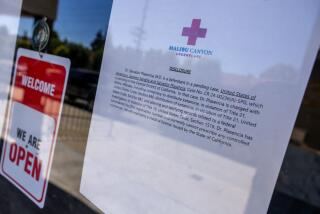Dallas Doctor Under Scrutiny in Patients’ Deaths
- Share via
DALLAS — In the final year of his life, Cecil Armitage built his days around the prescription narcotics he craved. The 61-year-old diesel mechanic was so logy from drugs that phone conversations sometimes ended with silence, then a thump, as he fell to the floor, said his sister Sandra Blackburn. Twice he overdosed and was rushed to the hospital. The third time, in March, he died.
Police found 27 bottles of pills at his home, including painkillers and sedatives prescribed by Daniel Maynard, a south Dallas doctor of osteopathy whose prescription practices investigators have linked to 13 patient deaths since 2000.
Maynard, 57, has not been arrested or charged with a crime, but five federal and state agencies are investigating him on suspicion of offenses ranging from manslaughter or criminally negligent homicide to insurance fraud and prescribing narcotics without a valid medical purpose. His medical license has been temporarily suspended.
“I know there are legitimate reasons to prescribe narcotics for chronic pain,” Dallas County Dist. Atty. Bill Hill said. “But the allegations against Dr. Maynard leave us to seriously question whether all of these patients had a true medical need for these hard narcotics.”
Records reviewed by the Texas attorney general’s office show that Maynard was one of the most prolific writers of narcotics prescriptions in the state. In 2002, he wrote more prescriptions for 10-milligram tablets of the sedative Diazepam (also known as Valium) than any other doctor in Texas. The same year, he wrote a total of 54,748 prescriptions, or 209 a day if he worked every weekday of the year.
The federal government froze Medicaid payments to Maynard after Dallas police seized patient files and other records from his clinic in June. The Texas Board of Medical Examiners suspended Maynard’s medical license pending final hearings this year.
Maynard’s “continuation in the practice of medicine would constitute a continuing threat to the public welfare,” the board wrote in the June 20 suspension order. The board looked into the apparent drug-overdose deaths of five patients and found “a complete lack of objective medical evidence to support the prescribing activities” of Maynard.
Maynard’s lawyer, James Rolfe, did not respond to attempts to contact him. In interviews with reporters before Maynard’s license suspension, Rolfe said Maynard believes he has done nothing wrong, and has caused no patient deaths.
The clinic closed after Maynard lost his license. But still the patients came, peering into the darkened building and tapping on the glass. Like many of Maynard’s clients, Billy Mathis defended him as a kindly physician who tended to the poor and elderly while others turned them away.
Maynard graduated from the Kirksville College of Osteopathic Medicine in Missouri in 1973, and was licensed as a Texas general practitioner the same year. Osteopaths are trained much like other medical doctors and can write prescriptions and perform surgery. Their medical training emphasizes the relationship of the body’s muscles, bones and nerves to a person’s health.
“He’s a good doctor and he helps my pain,” said Mathis, 57. He raised his shirt to show a patch adhered to his chest. It’s a slow-release morphine-like substance for a bad back, Mathis said. “He’s been curing people for years. He’s not forcing nobody to take pills. What am I going to do now?”
Velma Jenkins, 49, said she’s been going to Maynard for 20 years. “He checks you out. He’s not going to give you something that you don’t need,” she said.
Sequita Shead, 22, said she was feeling low before Maynard prescribed an antidepressant and medication to stimulate her appetite. “Everybody loves Dr. Maynard; I know I do. If you overtake the pills, that’s your fault,” she said. “You’re supposed to read the label and do what it says.”
Maynard’s clinic was a neighborhood fixture for years, drawing lines of patients who arrived before dawn to secure a place in the front of the pack. Maynard did not work by appointment; patients were seen on a first-come, first-served basis.
Fights broke out nearly every day when latecomers tried to cut in line, Mathis said. Recently, “two sisters jumped on a woman and hit her with a cane,” he said. “You saw those squabbles all the time. Some people didn’t want to wait.”
Maynard saw up to 200 patients a day, a former medical assistant at his office told investigators. “She said the time she worked there she had a lot of problems with patients being drunk or high on drugs,” wrote an investigator in a police affidavit. “She said that she had told [Maynard] that patients were selling drugs in the parking lot.”
If Maynard was a sole practitioner seeing 200 patients a day, “it’s not illegal but it’s probably unethical,” said Dr. B. Eliot Cole, director of education at the American Academy of Pain Management in Sonora, Calif. “Trying to see 20 to 30 patients a day is a very hard day for most pain practitioners.”
Most of Maynard’s patients were covered by Medicaid, according to the police affidavit. The document also implicates Maynard in a purported insurance-fraud scheme involving charges for medical services that were not performed. Maynard’s clients walked away from the clinic with a flurry of prescriptions, according to the affidavit, most filled at the pharmacy next door, which is also under criminal investigation.
For months, Cecil Armitage’s sister urged him to see another doctor. “As far as I’m concerned, Maynard is a drug dealer,” Sandra Blackburn said. “The only difference between him and a street dealer is he could do it legally.”
Armitage should not have been allowed to refill his prescriptions, she said. “Once you get addicted, you don’t care what the directions on the bottle say. He kept getting more and more pills.” Armitage’s relatives, along with four other families, are suing Maynard for what they say was gross negligence.
The criminal investigation of Maynard could take months to complete, Hill said. “We’re getting all the other patient files and are following up to see what happened to them,” he said. “This might just be the tip of the iceberg.”
More to Read
Sign up for Essential California
The most important California stories and recommendations in your inbox every morning.
You may occasionally receive promotional content from the Los Angeles Times.













